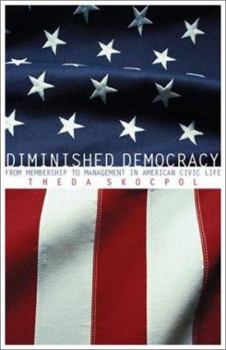Diminished Democracy: From Membership to Management in American Civic Life
(Part of the Julian J. Rothbaum Distinguished Lecture Series)
Select Format
Select Condition 
Book Overview
Pundits and social observers have voiced alarm each year as fewer Americans involve themselves in voluntary groups that meet regularly. Thousands of nonprofit groups have been launched in recent... This description may be from another edition of this product.
Format:Hardcover
Language:English
ISBN:0806135328
ISBN13:9780806135328
Release Date:January 2003
Publisher:University of Oklahoma Press
Length:366 Pages
Weight:1.34 lbs.
Dimensions:1.1" x 5.8" x 8.6"
Customer Reviews
3 ratings
One of the finest books I've ever read
Published by Thriftbooks.com User , 20 years ago
This book was incredible. I have never read anything so thought-provoking and well-written. I highly suggest that you read this book to fully understand the transition from membership to management in American Civic Life. Enjoy it.
The Urge to Belong
Published by Thriftbooks.com User , 21 years ago
A very nicely written book that raises several speculations. The author points out that in the 19th century, many of the local groups that people joined were chapters of national or transnational organisations. This was part of their attractiveness. Joining a local group gave comradely ties with others across the nation, that you had never met, and probably would never meet. How peculiar was this to the US, as compared with the European countries from which many of these people recently left? Is there any way to quantify this? A little unfair to ask, perhaps, because of the sheer amount of research needed to flesh it out. But the above questions arise naturally out of the research summarised in the book. Historians have asked if the US was qualitatively different from other countries. ("Vineyard of liberty" etc.) The issues raised by the book give us another way to address the question. Perhaps Americans were more inclined to join such nation spanning groups because as an immigrant, footloose people, if they did not have centuries of binding to the same soil and neighbours, they wanted some other and multiple means of belonging? Was the striking success of the groups in some part due to such inchoate urgings?Another way to test would be to look into the history of similar groups in Canada, Australia and New Zealand. Skocpol also points out that from the 1960s onwards, the membership of such groups in the US fell significantly. She advanced several reasons. But there is one possible reason for some of the decline that she did not mention. From the mid 1950s, TV became pervasive. Remember that joining a volunteer group is done in your recreational time. TV is a notorious competitor for that time, due to its convenience and cheapness. Plus, and more specifically, if one of your reasons (possibly unconscious) for joining a national group is to be part of a larger world, then TV assuages that to some extent. Granted, some of this may be illusory, but so what?
Reviving civic associations that are not trivial, obsessed
Published by Thriftbooks.com User , 21 years ago
... Many years ago, I fell into the habit of joining imaginary organizations. From time to time, depending on the pomposity level of the cocktail party I was attending, I have been: President, STABB, Society for the Total Annihilation of Beanie Babies. Executive Director, AAAAPM, "QuadrupleA/PM," the American Association for the Advancement of Applied PeripheroMetrics (Our motto: "If It's Far Enough Out, We'll Measure It"). Senior Logothete, Anarchic Chaotic Licentious Utopians, (ACLU). And most recently, Associate Visiting Carnivore, Protesters Enjoying Talking Angry (PETA). But now comes a new endeavor. APPROACH. Articulate Perceptive Persons Resolutely Opposed to American Civic Hypochondria. Thanks, Theda. I couldn't have done it without you. The Theda just acknowledged is the prolific and engaging Theda Skocpol, Harvard political scientist/sociologist and well-known commentator on American society, social policy, and all matters there unto pertaining. "Diminished Democracy" is not her best effort, if only because it started out in life as a University of Oklahoma lecture series, and lectures don't always transition well into books. Still, there is absolutely nothing wrong with "Diminished Democracy." It's clear, straightforward, solid, logical. The problem is the (expletive deleted) genre. It all seems to have started 50 years ago, with David Riesman's "The Lonely Crowd." Ever since, academics, pundits, and politicians have bemoaned the increasing isolation of Americans from each other, especially their ever-diminishing propensity to join the "voluntary civic associations" which, according to Tocqueville - Would congress please pass a 10-year moratorium on quoting Tocqueville? - provide the essential foundation of American democracy. By the 1980s, bewailing the isolation had become a veritable fixture of American intellectual life. "Habits of the Heart," a multi-author sociological study that drew heavily on Tocqueville, provided the template. More recently, there's been another template, Robert Putnam's insanely over-statistical "Bowling Alone." Meanwhile, any number of studies purport to prove that, not only are Americans no longer a nation of joiners, but when they do join (which they do avidly), it's the wrong kinds of groups - either self-interested, undemocratic advocacy organizations or trivial, self-obsessed "small groups" such as fundamentalist Bible study or ASAP, Adult Survivors of Adequate Parents, for people who can't blame it all on Mom & Dad. Could we please stop all the kvetching and just take a look at what is? Ms. Skocpol doesn't kvetch. At least, not much. And "Diminished Expectations" does indeed offer some worthwhile insights and prescriptions. The writer starts with a bit of historical revisionism. Contrary to Tocquevillian myth, the American penchant for voluntary association was never exclusively, or even primarily, local. From the early national period






